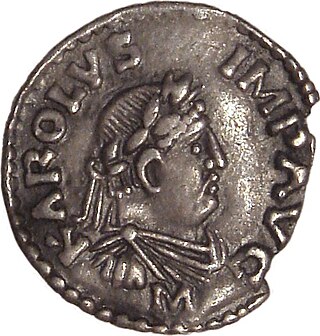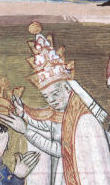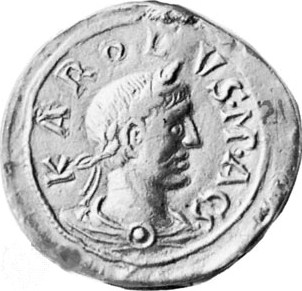
Charlemagne was King of the Franks from 768, King of the Lombards from 774, and Emperor of the Carolingian Empire from 800, holding all these titles until his death in 814. Charlemagne succeeded in uniting the majority of Western Central Europe, and was the first recognized emperor to rule in the west after the fall of the Western Roman Empire approximately three centuries earlier. Charlemagne's rule saw a program of political and social changes that had a lasting impact on Europe in the Middle Ages.

Pope Adrian I was the bishop of Rome and ruler of the Papal States from 1 February 772 to his death. He was the son of Theodore, a Roman nobleman.

The House of Bourbon is a dynasty that originated in the Kingdom of France as a branch of the Capetian dynasty, the royal House of France. Bourbon kings first ruled France and Navarre in the 16th century. A branch descended from the French Bourbons came to rule Spain in the 18th century and is the current Spanish royal family. Further branches, descended from the Spanish Bourbons, held thrones in Naples, Sicily, and Parma. Today, Spain and Luxembourg have monarchs of the House of Bourbon. The royal Bourbons originated in 1272, when Robert, the youngest son of King Louis IX of France, married the heiress of the lordship of Bourbon. The house continued for three centuries as a cadet branch, serving as nobles under the direct Capetian and Valois kings.

Carloman was the eldest son of Charles Martel, mayor of the palace and duke of the Franks, and his wife Chrotrud of Treves. On Charles's death (741), Carloman and his brother Pepin the Short succeeded to their father's legal positions, Carloman in Austrasia, and Pepin in Neustria. He was a member of the family later called the Carolingians and it can be argued that he was instrumental in consolidating their power at the expense of the ruling Merovingian kings of the Franks. He withdrew from public life in 747 to take up the monastic habit, "the first of a new type of saintly king", according to Norman Cantor, "more interested in religious devotion than royal power, who frequently appeared in the following three centuries and who was an indication of the growing impact of Christian piety on Germanic society".

Carloman I, also Karlmann, was king of the Franks from 768 until he died in 771. He was the second surviving son of Pepin the Short and Bertrada of Laon and was a younger brother of Charlemagne. His death allowed Charlemagne to take all of Francia and begin his expansion into other kingdoms.

The Carolingian dynasty was a Frankish noble family named after Charles Martel and his grandson Charlemagne, descendants of the Arnulfing and Pippinid clans of the 7th century AD. The dynasty consolidated its power in the 8th century, eventually making the offices of mayor of the palace and dux et princeps Francorum hereditary, and becoming the de facto rulers of the Franks as the real powers behind the Merovingian throne. In 751 the Merovingian dynasty which had ruled the Franks was overthrown with the consent of the Papacy and the aristocracy, and Pepin the Short, son of Martel, was crowned King of the Franks. The Carolingian dynasty reached its peak in 800 with the crowning of Charlemagne as the first Emperor of the Romans in the West in over three centuries. Nearly every monarch of France from Charlemagne's son Louis the Pious till the penultimate monarch of France Louis Philippe have been his descendants. His death in 814 began an extended period of fragmentation of the Carolingian Empire and decline that would eventually lead to the evolution of the Kingdom of France and the Holy Roman Empire.

A churl, in its earliest Old English (Anglo-Saxon) meaning, was simply "a man" or more particularly a "free man", but the word soon came to mean "a non-servile peasant", still spelled ċeorl(e), and denoting the lowest rank of freemen. According to the Oxford English Dictionary, it later came to mean the opposite of nobility and royalty, "a common person". Says Chadwick:
we find that the distinction between thegn and ceorl is from the time of Aethelstan the broad line of demarcation between the classes of society.

Charles III, also known as Charles the Fat, was the emperor of the Carolingian Empire from 881 to 887. A member of the Carolingian dynasty, Charles was the youngest son of Louis the German and Hemma, and a great-grandson of Charlemagne. He was the last Carolingian emperor of legitimate birth and the last to rule a united kingdom of the Franks.

The County of Toulouse was a territory in southern France consisting of the city of Toulouse and its environs, ruled by the Count of Toulouse from the late 9th century until the late 13th century.

The Kingdom of the Franks, also known as the Frankish Kingdom, the Frankish Empire or Francia, was the largest post-Roman barbarian kingdom in Western Europe. It was ruled by the Frankish Merovingian and Carolingian dynasties during the Early Middle Ages. Francia was among the last surviving Germanic kingdoms from the Migration Period era.

King of Italy was the title given to the ruler of the Kingdom of Italy after the fall of the Western Roman Empire. The first to take the title was Odoacer, a barbarian warlord, in the late 5th century, followed by the Ostrogothic kings up to the mid-6th century. With the Frankish conquest of Italy in the 8th century, the Carolingians assumed the title, which was maintained by subsequent Holy Roman Emperors throughout the Middle Ages. The last Emperor to claim the title was Charles V in the 16th century. During this period, the holders of the title were crowned with the Iron Crown of Lombardy.
The history of Toulouse, in Occitania, southern France, traces back to ancient times. After Roman rule, the city was ruled by the Visigoths and Merovingian and Carolingian Franks. Capital of the County of Toulouse during the Middle Ages, today it is the capital of the Midi-Pyrénées region.

Alamannia, or Alemannia, was the kingdom established and inhabited by the Alemanni, a Germanic tribal confederation that had broken through the Roman limes in 213.

Pepin or Pippin was King of Italy from 781 until his death in 810. Born Carloman, he was the third son of Charlemagne. Carloman was renamed Pepin upon his baptism in 781, where he was also crowned as king of the Lombard Kingdom his father had conquered. Pepin ruled the kingdom from a young age under Charlemagne, but predeceased his father. His son Bernard was named king of Italy after him, and his descendants were the longest-surviving direct male line of the Carolingian dynasty.

Hildegard was a Frankish queen and the wife of Charlemagne from c. 771 until her death. Hildegard was a noblewoman of Frankish and Alemannian heritage. Through eleven years of marriage with Charlemagne, Hildegard helped share in his rule as well as having nine children with him, including the kings Charles the Younger and Pepin of Italy and the emperor Louis the Pious.

Pepin the Short, was King of the Franks from 751 until his death in 768. He was the first Carolingian to become king.
Don Carlos of Spain or Infante Carlos of Spain may refer to:
Rotrude (Chrodtrudis) (or Crotude, Chrotrude, or Ruadtrud; died 724) was the first wife of Charles Martel, Mayor of the Palace and de facto ruler of Francia from 718 to 741. She was the mother of Pepin the Short, King of the Franks, and therefore the grandmother of Charlemagne. Rotrude is believed to be the daughter of Lambert, Count of Hesbaye, although this designation is not without controversy, as discussed below. She is also referred to as Rotrude of Treves.
Wilchar was the archbishop of the province of the Gauls, succeeding Chrodegang after 766 as the leading bishop in the kingdom of the Franks. Before receiving the pallium, he ruled a suburbicarian diocese in Rome. As archbishop, he held the diocese of Sens for a time (762/769–772/778) and afterwards held authority over all Gaul without a fixed see.















